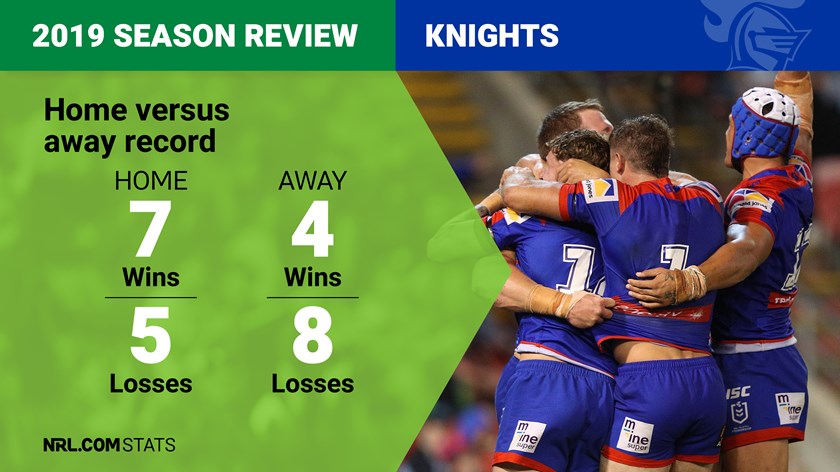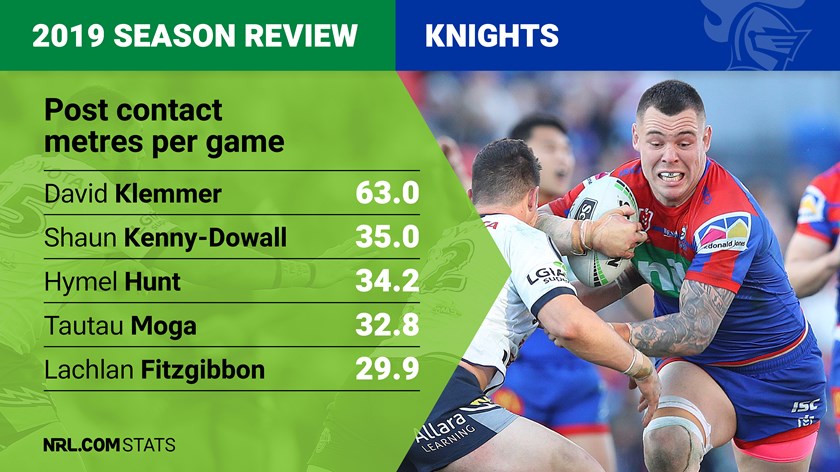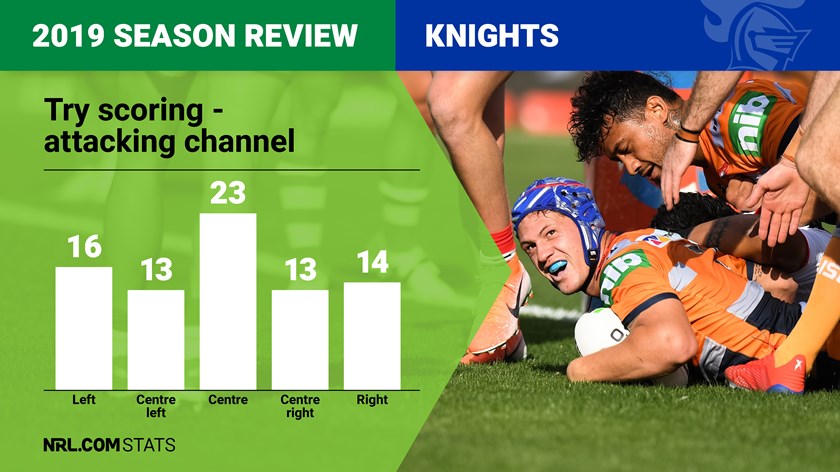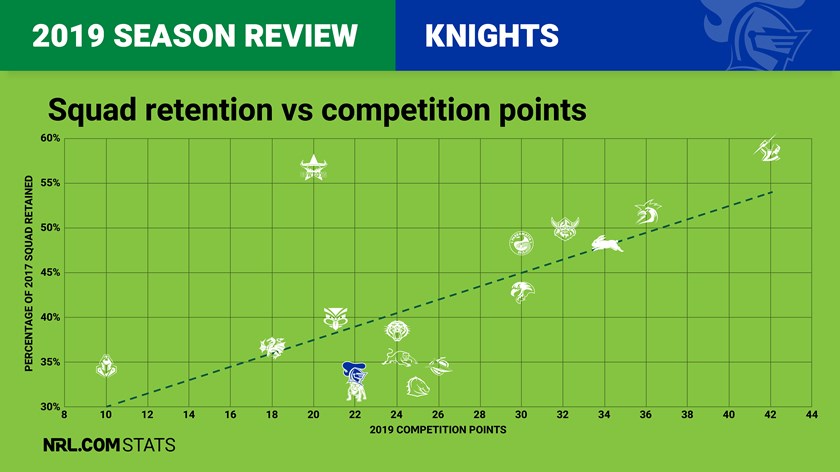A year that started with so much promise finished in more heartache for Newcastle.
Coach Nathan Brown's departure came as the Knights missed the finals for the sixth straight season.
After a roster overhaul featuring the additions of Kangaroos prop David Klemmer and rising outside back Jesse Ramien, 2019 was supposed to mark a new era of success.
And that's the way it seemed when after 12 rounds the Knights were sitting pretty in fourth place. Mitchell Pearce was leading the Dally M Medal count and fullback Kalyn Ponga in great form.
But a stretch of six losses from rounds 16 to 21 resulted in Newcastle crashing down the ladder, eventually coming 11th.
They were the only team stationed inside the top eight at the halfway point of the competition not to be there after round 25.
An unsettled Ramien departed in late July and Brown soon followed, leaving Kristian Woolf to oversee the last two games.
Premiership-winning former Roosters and Melbourne assistant coach Adam O'Brien takes the helm in 2020 and will be out to find the consistency that was absent last season.
It looks like you may be using adblocking software to view this site.
Many features on the site, such as video playback, may not work properly when using adblocking software.
Please whitelist our domain or disable your adblocker to access all features and videos.
Mitchell Barnett in focus
Knights: 2019 season by the numbers
Home & Away record
Home: 6-6. Away: 4-8.
After losing three from their first four at home, the Knights scored three consecutive mid-season victories in front of their faithful fans.
Arguably the highlight of Newcastle's season was the 38-12 romp over premiers the Roosters in round 11.
The momentum didn't last as they dropped four of their last five matches at McDonald Jones Stadium.
Despite an indifferent home record, Newcastle averaged more points (24.2) and conceded less (15.3) than the competition medians of 21.4 and 18.1.
However, the Knights averaged a whopping 28.3 conceded points per away fixture while scoring just 16.3.
Newcastle's 10 wins was their best return since 2014.

Post-contact metres
David Klemmer ranked fourth in the competition for overall post-contact metres (1324) and seventh per run (3.74m).
Despite Klemmer's impressive numbers, Newcastle (417m) came in second last for post-contact metres per match.
No other Knight recorded more than 820 post-contact metres for the season.

Try scoring - attacking channels
Newcastle bagged 29 of their 79 tries (37 per cent) down the left or centre-left channels.
Edrick Lee, Hymel Hunt, Lachlan Fitzgibbon and Mitchell Pearce were the most commonly used combination on that edge with 11 games together, while fullback Kalyn Ponga frequently chimed in.
Twenty-seven tries were registered in the right or centre-right channels and 23 came in the middle. Shaun Kenny Dowall, Jesse Ramien and Mitchell Barnett were the regulars on the right side.
Ponga (11) claimed the team's most four-pointers. He scored in six consecutive matches (rounds 6-11), including a double in round 10.

Tries conceded - defensive channels
Thirty-four of the 89 tries Newcastle conceded (38 per cent) were in the left or centre-left channels.
They leaked 33 tries (37 per cent) down the right or centre-right channels and 22 in the middle.
Data shows Jesse Ramien was responsible for the most try causes with 16 at 0.94 per game, followed by Kalyn Ponga (16 at 0.8 per game).

Tries conceded from penalties
The Knights conceded a try in the set after a penalty 16 per cent of the time (29 tries from 178 penalties).
Connor Watson was Newcastle's most ill-disciplined player with 22 conceded penalties (fourth in the competition).
He was followed by Mitchell Pearce (20) and Mitchell Barnett (17).

Metres gained from offloads
Second-phase play was certainly not a focal point of Newcastle's style - they ranked second last for offloads at eight per match.
So it's unsurprising they ranked second-last for metres gained in the carry after an offload (1316m).
Makeshift dummy-half Connor Watson used his speed around the ruck to grab a total of 263.7 metres (9.8m per run) following offloads.
Tim Glasby was the best provider, with his teammates running for 151.1 total metres after he got rid of the ball.

Goal-kicking accuracy
The Knights kicked 84 goals from 102 attempts for a success rate of 81.1 per cent. Penrith had the highest rate with 88 per cent.
First-choice goal-kicker Kalyn Ponga landed 48 goals at 80 per cent, while Mason Lino knocked over 33 goals at 85 per cent.
Newcastle's performance from the tee had no bearing on their finals disappointment. Even if the Knights had nailed every shot at goal, they would only have finished ninth.

Squad retention vs competition points
The top six teams last season retained more than 40 per cent of their 2017 squads, helping with cohesion and development.
While Melbourne kept almost 60 per cent of their squad from two years prior, just under 35 per cent of Newcastle's 2017 squad were still at the club.
The Bulldogs and Broncos were the only sides with marginally lower rates.
This statistic is indicative of the rebuild the Knights have undergone in recent years to become competitive again.

Players used
The Knights used 27 players throughout the season - the equal-second least amount behind the Raiders, Wests Tigers and Sharks (26).
Only three men debuted for Newcastle in teenagers Bradman Best, Phoenix Crossland and Starford Toa. The trio are seen as long-term prospects.

Defenders drawn
His arrival didn't bring about finals glory but David Klemmer was statistically immense.
The enforcer drew in three or more defenders when he ran the ball 73 per cent of the time - the highest rate in the competition among middle forwards (minimum of 150 runs).
He sucked in two defenders in a quarter of his carries and was stopped one-on-one just 2 per cent of the time.
Those numbers are phenomenal given Klemmer had the 10th-most runs of any middle forward in the competition (354 in 21 matches).



